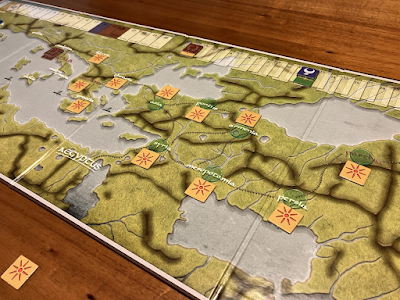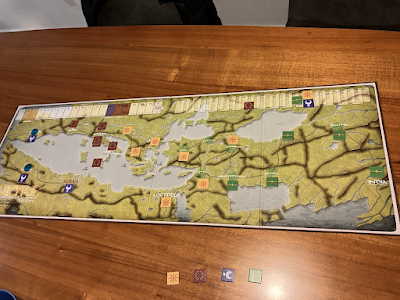Faced tonight with a sudden hankering to play a game, I trotted downstairs, surveyed the shelves, and settled upon Phil Sabin's Empire. As something that takes an epic subject, could be set up without too much rules review and can be got through in an hour, it was the obvious choice.
Covering the period 350-150 BC, the game takes in the Mediterranean world (stretching as far east as India) and its Persian, Macedonian, Carthaginian and Roman inhabitants. Each of the twenty game turns starts with a rebellion roll which turns one occupied territory neutral, and then the four powers get to take a turn attempting to expand. Usually a power gets one attack per turn, but in a great captain turn they will get five (so they best make the most of it).
There is not a lot to the game tactically: you are pretty much at the mercy of the dice. To successfully conquer a territory on Empire's point-to-point game map a power needs to roll 4 or better on a d6. There are modifiers at play, and with certain territories worth more for victory point purposes, it is usually clear what the best attack is, and then you have to hope the die (or dice when attacking across a sea route) will cooperate.
It's all very straightforward - even bearing in mind a couple of special rules - and with two victory turns (VPs are counted on turns ten and twenty), everyone knows what they are aiming at.
 |
| Opening situation: Carthage blue (3 territories), Rome red (1 territory), Macedon yellow (1 territory) Persia green (8 territories). |
In our game Macedonia started gloriously, winning Graecia on turn one and then watching Alexander wreak absolute havoc on turns two and three, wiping out the Persians and being on the doorsteps of both India and Aegyptus.
 |
| Alexander's conquests. |
Neither Carthage nor Rome could make much headway in the first century of play, but Persia / Parthia reclaimed its homeland just before the first victory turn was up, and with both Carthage and Persia receiving handicap assistance, the scores at 250 BC were recorded as Rome 5, Macedon 13, Persia 14 and Carthage 16.
Carthage and Rome squabbled over Gallia until Hannibal's entrance saw Rome's influence temporarily squashed. Two turns of great captains for Rome began promisingly, but perverse sea assault rolls and some untimely revolts meant Roman expansion was stopped at Sicily, Iberia and Macedonia.
All game Alexander's successors held on grimly to his conquests in Asia, but the Parthians (the Persian replacements) began to reclaim some of the eastern territories.
 |
| Parthians reconquer some of the ancestral homelands. |
Carthage and Rome continued to squabble ineffectually over Iberia, and at game end, the points were tallied thus: Rome 12, Persia / Parthia 20, and Carthage and Macedon tied for first place on 21.
 |
| Board at game end, 150BC. |
It was a nice little historical interlude, and left me with one or two ideas for future play.

This is a new one to me.
ReplyDeleteHi Jonathan, it was originally published by the Society of Ancients, and then Phil included a significantly upgraded version in his Lost Battles deluxe board game. The one I was playing is the latter version, obviously! Paul I. (former SOA editor and blogger 'Caliban') used it for an an excellent club campaign game back in the twentyteens.
DeleteThanks Aaron, never knew this existed, that is a very nice map and footprint. One to explore.
ReplyDeleteThanks Aaron. I got the deluxe version when it came out but have not yet played it. I had forgotten I had it! It was one of the games I bought with me in the move and renovations (most went into storage). Three years on and still not played. I have got it out, at least it is closer to being played than it was before.
ReplyDeleteHi Shaun, It's one I've toyed with using for a campaign, but never quite got round to it. Hope you give it a crack! Cheers, Aaron
DeleteSounds like a fun game Aaron. I backed Successors on Kickstarter but still haven’t got around to playing it yet.
ReplyDeleteHiya Mike, if the Successors you mean is the one I think you mean, it's supposed to be a blast!
DeleteFirst time hearing of this one, too; looked enjoyable!
ReplyDeleteHi Peter - yes, was the perfect game for the occasion! Hope you are well, Aaron
DeleteI used this ultra-simple game for many years in my BA ancient warfare class. It is still available as a stand-alone game at https://www.soa.org.uk/joomla/sabin-games.
ReplyDeleteThanks, Phil.
DeleteEmpire is indeed a simple game, which I have played once. However, since then I have used a variation as the basis for a campaign, though with the start date set a little later. Unfortunately I had to pause the campaign when I relocated and time became short. At some point I will restart it. You can find it here:
ReplyDeletehttps://ancientwargaming.wordpress.com/empire-the-macedonian-punic-wars/
It would be interesting to see with some tweaks Alexander's Empire as it breaks down via rebellion roles, those provinces could become factions in their own right with the ability to make attack rolls and expand themselves!
ReplyDeleteWhat a great sounding and looking game. One that I too knew nothing of. Thanks for the introduction and sample game.
ReplyDeleteRegards, James
Excellent stuff Aaron, not sure if my comment didn't go through or is lost in spam, it was along the lines of; It would be interesting to see how the game would go if rebellious regions became their own autonomous nations. Depending who currently owns them Alexanders empire with a rebellious Egypt could become Ptolemaic dynasty for example.
ReplyDeleteHi Tony, sorry for the late reply! Yes, I think that is the idea. However, the factions are broad, so they are all lumped in as 'Greek' rather than Ptolemaics, Seleucids etc. I think you could profitably bring in those distinctions if you were using it as the basis of a campaign.
ReplyDeleteIndeed I was thinking of such a thing a campaign driven by miniature battles! Macedonia loses Egypt to rebellion, unable to surpress them they become the Ptolemaic dynasty now they get a chit to be drawn and can start their own invasions. I'll have to give it a go!
Delete